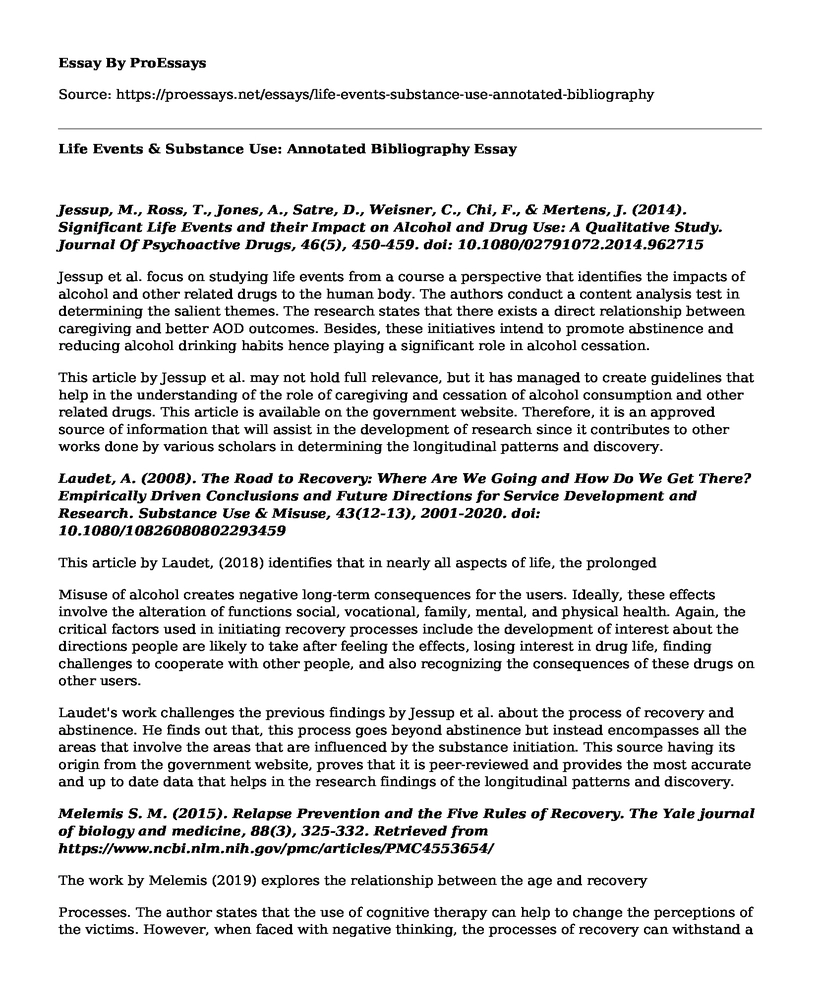Jessup, M., Ross, T., Jones, A., Satre, D., Weisner, C., Chi, F., & Mertens, J. (2014). Significant Life Events and their Impact on Alcohol and Drug Use: A Qualitative Study. Journal Of Psychoactive Drugs, 46(5), 450-459. doi: 10.1080/02791072.2014.962715
Jessup et al. focus on studying life events from a course a perspective that identifies the impacts of alcohol and other related drugs to the human body. The authors conduct a content analysis test in determining the salient themes. The research states that there exists a direct relationship between caregiving and better AOD outcomes. Besides, these initiatives intend to promote abstinence and reducing alcohol drinking habits hence playing a significant role in alcohol cessation.
This article by Jessup et al. may not hold full relevance, but it has managed to create guidelines that help in the understanding of the role of caregiving and cessation of alcohol consumption and other related drugs. This article is available on the government website. Therefore, it is an approved source of information that will assist in the development of research since it contributes to other works done by various scholars in determining the longitudinal patterns and discovery.
Laudet, A. (2008). The Road to Recovery: Where Are We Going and How Do We Get There? Empirically Driven Conclusions and Future Directions for Service Development and Research. Substance Use & Misuse, 43(12-13), 2001-2020. doi: 10.1080/10826080802293459
This article by Laudet, (2018) identifies that in nearly all aspects of life, the prolonged
Misuse of alcohol creates negative long-term consequences for the users. Ideally, these effects involve the alteration of functions social, vocational, family, mental, and physical health. Again, the critical factors used in initiating recovery processes include the development of interest about the directions people are likely to take after feeling the effects, losing interest in drug life, finding challenges to cooperate with other people, and also recognizing the consequences of these drugs on other users.
Laudet's work challenges the previous findings by Jessup et al. about the process of recovery and abstinence. He finds out that, this process goes beyond abstinence but instead encompasses all the areas that involve the areas that are influenced by the substance initiation. This source having its origin from the government website, proves that it is peer-reviewed and provides the most accurate and up to date data that helps in the research findings of the longitudinal patterns and discovery.
Melemis S. M. (2015). Relapse Prevention and the Five Rules of Recovery. The Yale journal of biology and medicine, 88(3), 325-332. Retrieved from https://www.ncbi.nlm.nih.gov/pmc/articles/PMC4553654/
The work by Melemis (2019) explores the relationship between the age and recovery
Processes. The author states that the use of cognitive therapy can help to change the perceptions of the victims. However, when faced with negative thinking, the processes of recovery can withstand a considerable obstacle, more so among the old people. Besides, negative thinking can be addictive, leading to stress and anxiety among the people of 65 years of age and above as compared to the recovery processes in young children.
Moreover, regardless of the age factor, the process of creating and offering
Recovery among the various age groups may require some particular strengths that some individuals may not possess. Hence, the difference in ages may not hold a crucial role in the recovery processes. This article by Melemis is a recent publication done in 2019. Therefore, it proves its authenticity and originality in offering the most updated information that helps in the research about the relationship between the age difference and treatment.
White, W. (2006). Recovery Across the Life Cycle from Alcohol/Other Drug Problems. Alcoholism Treatment Quarterly, 24(1-2), 185-201. doi: 10.1300/j020v24n01_11
The author of this article focuses on exploring the relationship between the age of individuals and the prospects' recovery. In essence, across the developmental life cycle, human beings may develop problems related to the misuse of alcohol and other drugs. Further, White elucidates that the ability to offer treatment and recovery depends on the substance use from mid-to-late adolescent since, during childhood, there was a clinical disorder among the kids
It is easy to provide treatment and recovery processes to adolescents between the age of 12 and 14 through the administering of early-onset than to help in the recovery of 35 years old adults. However, White also contradicts the early thoughts about the treatment and improvement in terms of the age factor. He notices that the confirmation of more miserable recovery methods may also hinder this process among the adolescent. This source of information has conducted extensive research that borrows from the works of other scholars, hence making it useful and relevant for this topic.
Cite this page
Life Events & Substance Use: Annotated Bibliography. (2023, Feb 23). Retrieved from https://proessays.net/essays/life-events-substance-use-annotated-bibliography
If you are the original author of this essay and no longer wish to have it published on the ProEssays website, please click below to request its removal:
- Pharmacology and Physiology: Alcohol Drinking Essay Example
- Racial Classification Paper Example
- Articles Analysis Essay on Relation Between Waters "Once Again" and Stratton "Colonial Citizens"
- Essay Example on PopCult and PostFem: Attitudes and Influences
- Essay Example on Social Advocacy: Working to End Discrimination
- 9/11 Attacks: The Patriot Act & Government Responsibility - Essay Sample
- Racism in America: White Supremacy and Boundaries of Identity - Essay Sample







